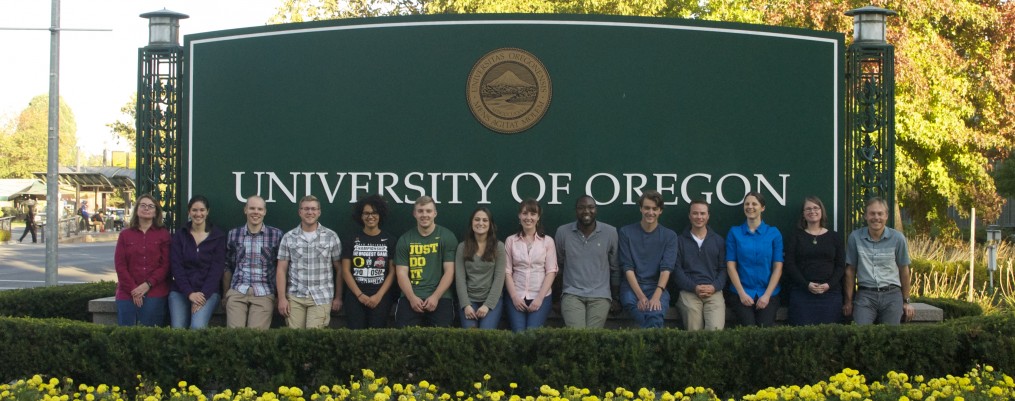
Dr. James E. (Jim) Hutchison joined the faculty at the University of Oregon (UO) in the fall of 1994. He now holds the Lokey-Harrington Chair in Chemistry. His research interests are in green chemistry, materials chemistry and nanoscience. He led the development of the UO’s nation-leading curriculum in “green” (environmentally-benign) organic chemistry, launched the university’s pioneering Center in Green Nanoscience and is a member of the Governing Board of the ACS Green Chemistry Institute. He is a member of the leadership team for the Oregon Nanoscience and Microtechnologies Institute (ONAMI) and founded, and now directs, the ONAMI’s Safer Nanomaterials and Nanomanufacturing Initiative (SNNI). He is the author of more than 125 refereed publications, three book chapters and a text book (“Green Organic Chemistry: Strategies, Tools and Laboratory Experiments”).
Background:
B.S., University of Oregon (performed undergraduate research with Richard G. Finke), 1986
Ph.D. (Organic Chemistry), Stanford University, 1991 (Advisor: James P. Collman)
Postdoctoral Associate, University of North Carolina at Chapel Hill, 1992–94 (Advisor: Royce W. Murray).
Honors and Awards:
Phi Beta Kappa; Franklin Veatch Fellowship, Stanford 1987–89; Centennial Teaching Assistant Award, Stanford, 1990; NSF Postdoctoral Fellow, 1992–94; Camille and Henry Dreyfus New Faculty Award, 1994; NSF CAREER Award, 1997; Alfred P. Sloan Research Fellow, 1999; Camille Dreyfus Teacher-Scholar, 1999; Oregon Academy of Science Outstanding Teacher of Science and Mathematics in Higher Education, 2003, University of Oregon Fund for Faculty Members Excellence Award, 2006. Lokey-Harrington Chair in Chemistry, 2008.
Professional Experience:
Current
2015–Present: Associate Vice President for Research and Strategic Initiatives
2008–Present: Lokey-Harrington Chair in Chemistry
2006–Present: Co-founder and scientific advisor, Dune Sciences, LLC
2006–Present: Member/Advisor, ACS Green Chemistry Institute Governing Board
2004–Present: Director, Safer Nanomaterials and Nanomanufacturing Initiative, ONAMI
2004–Present: Professor of Chemistry, University of Oregon
1994–Present: Member, Materials Science Institute, University of Oregon
Past
2007–2011: Associate Vice President for Research and Strategic Initiatives
2007–2012: Co-chair, Coordinating User Group for the construction of the Lewis Integrative Science Building (ISC Phase 2)
2004–2008: Chair, User Committee for the construction of Integrative Science Complex, Phase 1 Building at the UO
2003–2007: Director, Materials Science Institute
2000–2004: Associate Professor of Chemistry, University of Oregon
1999–2003: Treasurer, Materials Science Institute
1994–2000: Assistant Professor of Chemistry, University of Oregon
Synergistic Activities:
Green Chemistry
Developed the world’s leading green chemistry education program focused on an organic chemistry laboratory curriculum that reduces hazard and waste while modernizing the lab curriculum. 180 faculty from around the world have participated in our week-long curriculum adoption workshops. Authored the first green chemistry textbook for organic lab (Doxsee, K. M.; Hutchison, J. E. Green Organic Chemistry: Strategies, Tools and Laboratory Experiments, 2004.) that introduces the tools and strategies of green chemistry and contains 19 greener organic chemistry lab experiments that teach the fundamental concepts and lab techniques.
Leadership posts in the green chemistry community – Member, Governing Board of the ACS Green Chemistry Institute and co-chair, 2008 Gordon Research Conf. on Green Chemistry.
Green Nanoscience
Pioneered the field of green nanoscience (see Green nanoscience: An integrated approach to greener products, processes, and applications,” Chemistry Today 2004, 30-33.
Founder/Director, Safer Nanomaterials and Nanomanufacturing Initiative, an interdisciplinary initiative involving 30 faculty from four institutions developing the design rules for greener nanoscale products and processes.
Innovations in Graduate Education
Co-developed the Graduate Program in Semiconductor Science, a new interdisciplinary curriculum that helps masters and Ph.D. students apply their fundamental knowledge in chemistry and physics to solving real-world challenges in engineering environments.
